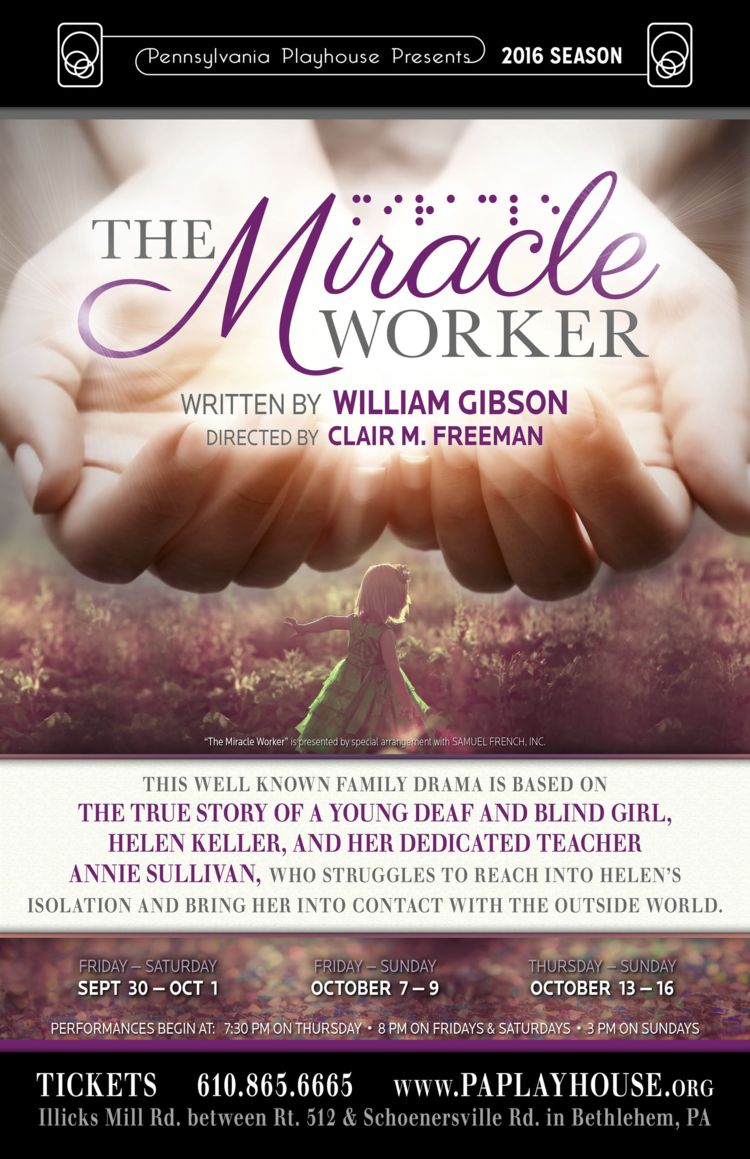Set in the hazy countryside of post-Civil War Alabama, William Gibson's classic story about Helen Keller and her teacher, Annie Sullivan, is sure to warm the heart. Pennsylvania Playhouse’s production of Gibson’s script does not fail to deliver.
The play depicts the turmoil of a family in need of a miracle – both for their seemingly-unreachable daughter, and for their own tired, worn-down selves. What they do not bargain for, however, is when this miracle shows up on their doorstep in the form of a stubborn, tenacious young woman intent on teaching Helen to speak for herself.
Both Hannah Kurczeski as Helen and Jenna McBreen as Annie are extremely well cast. The prolonged physical struggles between the two characters and their efforts to physically communicate are fascinating to watch, not to mention (I’m sure) challenging to portray. One of the best scenes in the play is a long segment between the two characters in which McBreen (Annie) attempts to get Kurczeski (Helen) to remain seated at her place at the dinner table and to use a spoon to eat her dinner; almost no words are spoken throughout the entire scene, but every intention is clear. It is at these moments that the play really comes alive, and we begin to “see” the world from Helen’s point of view. Our sense of verbal communication as primary falls away, and we begin to understand meaning in different terms. One could say that by the end of the play, the audience finds their own “miracle”: as Helen learns to understand the concept of communication in words, we begin to understand the concept of communication without them.
The performance manages to reach far beyond even this lofty message, however. The entire cast of characters within Helen’s family and beyond demonstrates the parallel journeys of those around her. Helen’s father (Jim Long) nurses his pride after losing the Civil War by asserting the authority he feels his gender and his race give him in his own household. His son (Brett Mathews) fights his own inner battle in confronting his father. Helen’s mother (Makenna Masenheimer) keeps the peace, while being herself tormented by Helen’s suffering. And Viney (Geraldine E Byrd) manages all of them while delighting audiences with her spirited insight and commentary. It is actually this mixture of struggles, more than the barrier of sound, vision or language, that keeps Helen trapped. And it is only with their resolution that Helen is able to free herself. Pennsylvania Playhouse’s production delicately weaves together this fabric of conflicts with an array of distinct and committed performances.
I have to wonder, however, in the midst of the Lehigh Valley Arts Council’s “Arts and Access” campaign, how someone who is differently-abled in vision or hearing might experience this play. Would they follow the action' Would they catch the storyline' Would they recognize themselves in the misunderstood Helen' If anything, the play’s redeeming value is its ability to expose seeing and hearing audiences to the experiences of those without these senses, especially in the context of the ableism of the late 1800s.
In all, Pennsylvania Playhouse delivers a compelling rendition of Gibson’s The Miracle Worker, while hopefully broadening understanding for differently-abled people.
'The Miracle Worker' is directed by Clair Freeman and stage managed by Brian McDermott.
'The Miracle Worker' plays through October. For information, please visit http://www.paplayhouse.org/season
